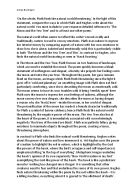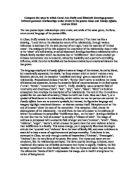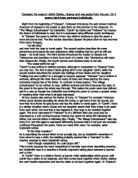Lizzie, Six uses dark and negative lexis throughout to increase the feeling of the suffering inflicted and the dialogue between the characters is disturbing. The doubling of the words ‘moon’, ‘fields’, ‘love’, ‘wood’ and ‘dark’ in lines 2 and 3 of each stanza are offered primarily in the view of the innocence of a child, i.e. In literature, the moon is commonly linked to imagination and fields to that of freedom etc. Secondly the words are manipulated by the adult abuser, effectively stripping the original association of the word and replacing it with a horrific alternative showing the intention of emotional abuse. Wood says that Duffy presents ‘a poignant example of “broken listening”, of – in this case — the adult listener refusing to hear or misinterpreting what is heard and of the child destroyed by being unheard and ignored’ (B Wood, 2006). It also represents consistent and worsening abuse as the words start with a lighter, childlike tone ‘moon’, ‘fields’ and literally end with ‘dark’. The use of language in Lizzie, Six is vulgar, particularly towards the end of the poem; Duffy uses this to show how the level of abuse and suffering worsens throughout the poem and over time and transitions from mental to physical suffering. She shows this in the penultimate stanza when the abuser says ‘I’ll give you wood, when your bottom’s bare’. ‘Wood’ is a disturbing metaphor and the literal intention the abuser becomes apparent here. The abuser asks in stanza five ‘Where are you hiding?’ Duffy uses this to allow the reader to see the abuser demonstrating his menacing mental control over Lizzie as she is powerless to hide from him. In the sixth stanza, the abuser asks ‘Why are you crying?’ – a physical display of an emotional response. (Morgan, Classnotes, 2015). Duffy shows a similar representation of the emotional and physical realms of suffering in Shooting Stars. ‘I heard the click. Not yet. A trick’ - The Nazi soldier at the time of the speaker’s execution uses excessive cruelty and mental torture in toying ‘with his victim and the short sentences at the end of the line create tension and a sense of the real experience of the woman and the power wielded by the soldier’ (MissGrant, 2015). Duffy demonstrates physical anguish in the third stanza at the fear of rape from the Nazi’s ‘My bowels opened in a ragged gape of fear’. Duffy’s word choice here is extreme but emphasizes the sheer terror that a woman would go through in this situation. The ‘gape’ is representative of a screaming mouth (MissGrant, 2015) and is intentionally inversed as ‘gagged rape’. The effect it has is it to double the meaning and subsequently intensify the horror of the suffering she endured in this situation. Heaney represents the emotional suffering in the form of their love of the country, not necessarily the Irishmen individually but as a whole, due to the oppression from the English – ‘we moved quick and sudden in our own country’. Heaney demonstrates the resentment of the Irish in this sentence and ‘the priest lay behind ditches with the tramp’ – Heaney juxtaposes the holiest man with the lowliest man, neither had any advantage over the other when it came to slaughter from their oppressors. The personification Heaney offers upon the Irish defeat on Vinegar Hill ‘The Hillside blushed, soaked in our broken wave’; Provokes the emotional and physical in the form of slight embarrassment at their being ill equipped to deter the English attack ‘shaking scythes at cannon’ but also the physicality or their blood staining the green of the fields to red. The first and last line include the imagery of barley, a symbol for revolution and independence (Morgan, Classnotes, 2015). Heaney uses Irony from the barley that the Irish rebels carried in their pockets for food, was in fact the very same that enabled the barley ‘to grow up ‘out of the grave’ fertilized by the blood of Irish souls. Critic Paul Hurt says that the first line ‘The pockets of our greatcoats full of barley’ and the last line ‘And in August the barley grew up out of the grave’ “are contrived. They belong to the world of 'self-consciously significant details' which are routine in many war films, in films of all kinds” (Paul Hurt, 2015). But Critic Blake Morrison said that Seamus Heaney is ‘that rare thing, a poet rated highly by critics and academics yet popular with ‘the common reader’ and as a common reader, I’m rather inclined to appreciate the majestic quality and symbolism of the re-birth of an army ready to fight and again.
All three poems have a common feature with the echoed sadness and ill treatment and respect imposed from their oppressors with mass and shallow graves in Shooting Stars and Requiem ‘they buried us without shroud or coffin’ and ‘between the gaps of corpses I could see a child’. And in Lizzie, Six, the abuser’s final statement ‘I’ll give you the dark and I do not care’.
The sentence and grammar structure in Lizzie, Six, is rigid and unchanging. The first line of each stanza is a question from the abuser, the second a response from the abused and in the third and fourth lies a demonic manipulation of Lizzies answer; Wood says ‘The child’s fear is answered only by a distorted or distorting “echo” from the adult world which, if less brutal and punitive than the world of “Lizzie, Six”, is equally isolating and disquieting.’ (B Wood, 2006) Possibly Duffy used this sentence structure to emphasise the unrelenting suffering in the emotional, and physical that Lizzie faces. In Shooting Stars, Duffy takes an alternative approach and to represent the last thoughts of a dying woman offers a certain level of enjambment within the text. The punctuation is free in that ‘Rebecca Rachel Ruth Aaron Emmanuel David’ are listed without breath to exaggerate the extent of the ‘nameless’ people that have suffered. This is also a juxtaposition. This continues later in the poem with ‘Sara Ezra…’ Duffy has done this to show the list could go on and on without pause. Almost as if those that have suffered spring to mind too easily for the sheer number of victims. Duffy uses repetition in the use of the word ‘Remember. A resounding theme of the poem is to remember the suffering of an entire race and to relate this lessons of history to modern day struggles. Duffy uses Anaphora in the fifth stanza to reiterate this theme. “After immense suffering someone takes tea on the lawn. After the terrible moans a boy washes his uniform. After the history lesson children run to their toys”. ‘Tea on the lawn’ refers to how normal life can resume so quickly after horrific events have taken place and can be forgotten as easily as ‘a boy washes his uniform’ symbolic of the cleansing of the Jewish race (MissGrant, 2015). Heaney uses enjambment to slow the pace. It is used to represent the Irish Rebels speed of movement; ‘A people, hardly marching – on the hike-‘, common folk, pacing themselves and climbing a hill, probably wounded, weary and hungry. Enjambment is used where the sonnet breaks form and introducing their demise; ‘Until, on Vinegar Hill, the fatal conclave.’ Heaney uses this sentence structure to slow the reader and to emphasise the fall of the rebels and their devastation emotionally and physically. It adds a dramatic and magnificent tone to their sacrifice. In a similar sub-theme to Shooting Stars, remembrance is also a theme in Requiem, highlighted throughout the poem by Heaney’s word choice.
Sound, sight, touch and sensation feature regularly in Shooting stars to evoke emotion. Straight away we are greeted with silence from the Dead Jew ‘After I no longer speak’ – a tradition of remembrance. We have a glimpse into her life that she was married, Duffy displays this with the ‘wedding ring’, the dear that caused the sensation of ‘urine trickling down her legs’ – a physical display of an emotional response. And the brutal and callous touch of the soldiers to ‘salvage’ what they see as the only valuable part of her when they break her finger to retrieve her wedding ring. Duffy uses the element of Marriage to re-inforce human emotion as a juxtaposition against the desensitised Nazi’s. Duffy also uses onomatopoeia in the word ‘click’ to highlight the mental torture the soldier imposes on the Jewish prisoner.
Assonance and rhyming are used continuously through Requiem to promote the feeling of a steady struggle. ‘kitchens’ and ‘stricking’, ‘sudden’ and ‘country’ in the opening lines. ‘camp’, ’tramp’, ‘hike’ and ‘pike’ are rhymes used every other line. Heaney does this to re-inforce the military tone of the poem, introducing a steady drumming for the rebels to march in time to. Heaney breaks the rhyme momentarily to create a sense of doom. He shows this in ‘the final conclave’. Heaney returns immediately to the rhyme to emphasise the re-birth of the soldiers and the importance of the remembrance for the those who suffered so they could live. Duffy uses a similar technique in Shooting Stars in ‘opened the ragged gape of fear’ to re-inforce horror of the statement. She also uses alliteration in ‘Rebecca Rachel Ruth’ and uses traditional Jewish names to heighten the exhaustive list of those who suffered. In Lizzie, Six, Duffy uses consonance rather than assonance and alliteration, closely implied to Anaphora to accentuate the nervous disposition of the reader ‘What’, ‘Where’, ‘What’, ‘Where’, ‘Why’ at the beginning of each stanza and consonance in ‘I’m afraid of the dark. I’ll give you the dark and I do not care’ similar to the techniques used in Shooting Stars in the first line uses consonance and an imperfect pararhyme ‘speak and break’ in the first line. an All three poems have a common theme of rhyme, but the intention is different. Lizzie, Six and Requiem show tail rhyme and holorime both in an effort to make the poem memorable, but Duffy uses this in Lizzie, Six to exaggerate the loss of innocence of a child. Rhyming the poem in a simplistic child-like manner emphasises the haunting suffering. Whereas Heaney uses this technique to signify the remembrance theme of the poem, taking the literal of making the poem memorable and easy to read.
All three poems have a common connection to the suffering imposed from an oppressor. For Lizzie, Six, Lizzie is suffering at the hands of her abuser. For Shooting Stars, the Jewish women and the Jewish race are suffering from the oppression of the Nazis and for Requiem for the Croppies, the Irishmen suffering for the loss of their land to the English. Shooting Stars and Requiem have a sub-theme of remembrance and Lizzie Six, the loss of innocence. Though loss of innocence can be found in Shooting Stars and Requiem, their sufferance is predominantly for a race, and land rather than innocence. Regular assonance and consonance are used throughout all three poems, but to different ends, similarly with intentional use of rhyming. The poems vividly highlight suffering throughout, with careful word choice, simplistic yet vulgar in Lizzie, Six to make the suffering more haunting, Grim and factual in Shooting Stars to exaggerate the horror of the suffering and militant and simple to aid the remembrance of the those who suffered in Requiem for the Croppies.
References
Gardiner, M. (2015). Summaries of selected poetry by Seamus Heaney (Higher School Certificate 1998). [online] Files.puzzling.org. Available at: https://files.puzzling.org/wayback/hsc/heaney [Accessed 17 Nov. 2015].
Grant, M. (2015). [online] View.officeapps.live.com. Available at: https://view.officeapps.live.com/op/view.aspx?src=http%3A%2F%2Fmissgrantenglish.wikispaces.com%2Ffile%2Fview%2FRevision%2BPack.docx [Accessed 18 Nov. 2015].
Hurt, P. (2015). Paul Hurt on Seamus Heaney's 'The Grauballe Man' and other poems. [online] Linkagenet.com. Available at: http://www.linkagenet.com/reviews/heaneypoemcriticism.htm#requiem [Accessed 18 Nov. 2015].
McMahon, D. (2013). A quick reading of Seamus Heaney's "Requiem for the Croppies". [online] pulpteacher. Available at: https://pulpteacher.wordpress.com/2013/03/13/a-quick-reading-of-seamus-heaneys-requiem-for-the-croppies/ [Accessed 17 Nov. 2015].
Morrison, B. (1993). Seamus Heaney. London: Routledge.
Rahim, S. (2013). Requiem for Seamus Heaney. [online] Telegraph.co.uk. Available at: http://www.telegraph.co.uk/culture/books/10276389/Requiem-for-Seamus-Heaney.html [Accessed 18 Nov. 2015].
Smith, S. (2007). Poetry and displacement. Liverpool: Liverpool University Press.
The Student Room, R. (2015). Revision:Carol Ann Duffy Revision Notes - The Student Room. [online] The Student Room. Available at: http://www.thestudentroom.co.uk/wiki/Revision:Carol_Ann_Duffy_Revision_Notes [Accessed 18 Nov. 2015].








